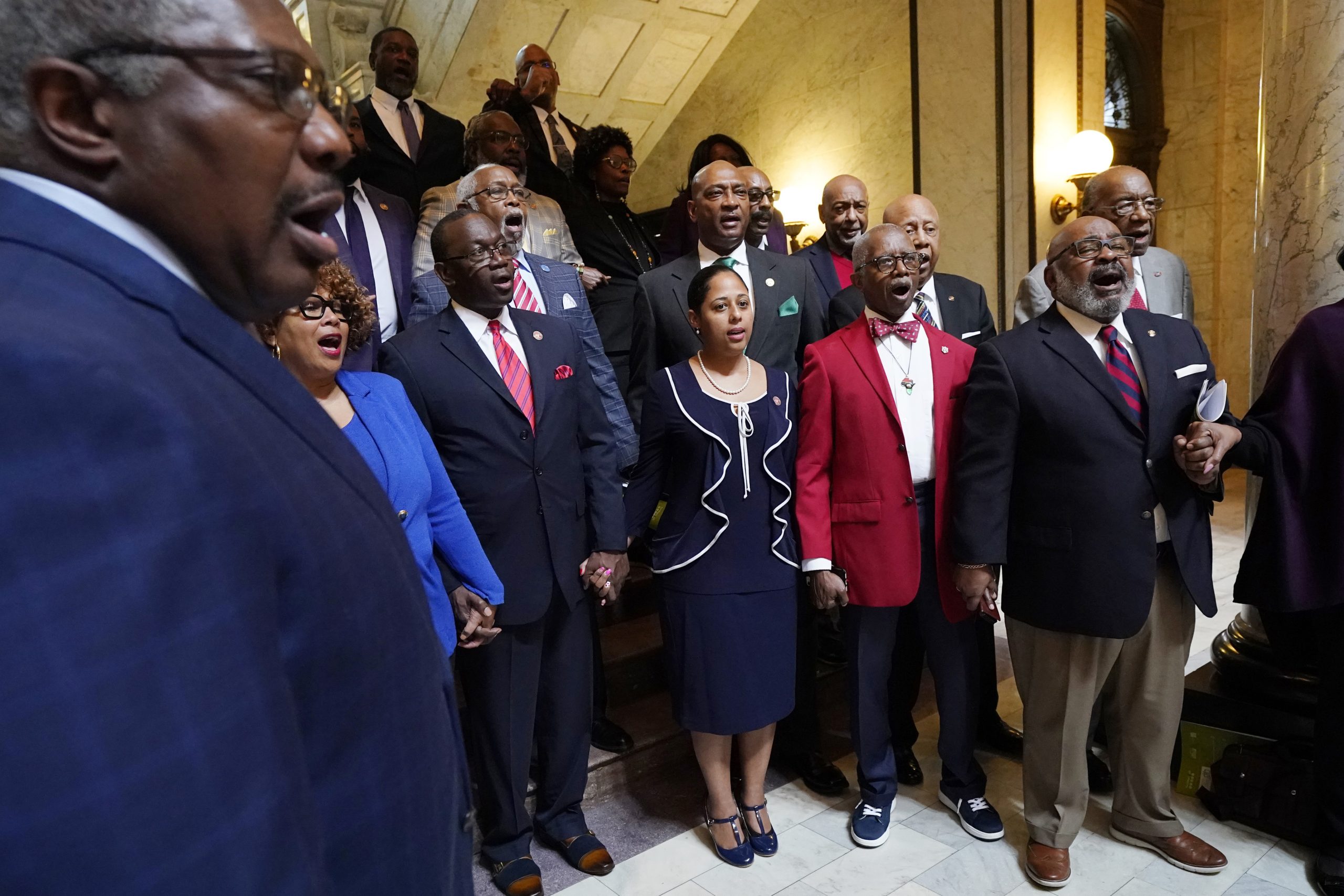Mississippi Today
Republicans don’t have to listen to their Black colleagues. That’s how they designed it.

Republicans don't have to listen to their Black colleagues. That's how they designed it.
Note: This editorial anchored Mississippi Today's weekly legislative newsletter. Subscribe to our free newsletter for exclusive access to legislative analysis and up-to-date information about what's happening under the Capitol dome.
Mississippi Republican legislative leaders don't have to listen when their Black colleagues tell them that they're stripping voting power from Black Mississippians.
They don't have to listen when they're told that they're passing a bill that is bound for yet another federal court battle, that they're stoking racial division across the state, that they're once again drawing horrible national attention, that they're dragging Mississippi back in time.
Republicans have carefully created for themselves a legislative body with virtually unlimited and unchecked power. It allows them to completely shut people who don't look like them or think like them out of the legislative process, and they often use it to pass legislation that stretches the limits of democracy.
This is no accident. Over the past 30 years, as Mississippi's electorate shifted from the Democratic to Republican Party, Republicans used their newfound power to strategically redraw legislative districts and give themselves supermajority control of both the Senate and House. They can, without any say whatsoever from Democrats, pass any bill they want. Inside the Capitol, a small handful of GOP leaders have drawn up rules that give them all the power, and rank-and-file legislators — including the vast majority of Republican legislators — wield little influence over what passes or fails.
Democrats, meanwhile, the party of the overwhelming majority of Black Mississippians, have no voting power at all inside the Capitol. They can give impassioned speeches at the wells, they can stretch debates to four-plus hours, they can walk off the floor to protest racist bills, they can hold fiery press conferences, but they cannot stop Republicans from passing any single piece of legislation.
There is almost never partisan compromise. There is rarely genuine debate. There is plenty of one-sided control.
READ MORE: The purposefully broken lawmaking process in Jackson
With this power, Republicans have passed all sorts of legislation the past couple years despite vocal pushback from Black lawmakers: a critical race theory ban, which famously led every Black senator to walk off the floor in protest before the final vote; tighter legislative and congressional redistricting maps that diluted Black voting strength; the nation's strictest voting laws in a state with a sordid, racist history; massive tax cuts that disproportionately affect poor and Black taxpayers; and anti-LGBTQ legislation that threatens the lives of a vulnerable population.
But perhaps no legislation better showcases the unilateral GOP control under the dome better than House Bill 1020, which passed the House late in the evening of Feb. 7.
Yes, the national headlines you read last week were accurate: A mostly-white House supermajority passed a bill that would create a completely white-appointed judicial district and expand the police force within the whiter areas of Jackson, the Blackest large city in America.
For more than four hours, Black House members delivered what should be certainly considered some of the most cautionary and impassioned speeches ever made in the Mississippi State Capitol building. Many of their comments echoed ones made by their predecessors in the building and civil rights leaders of 60 years ago.
Rep. Ed Blackmon, D-Canton: “Only in Mississippi would we have a bill like this, with our history, where you say solving the problem is taking the vote away from Black people because we don't know how to choose our leaders … This is just like the 1890 Constitution all over again. We are doing exactly what they said they were doing back then: ‘Helping those people because they can't govern themselves.'”
Rep. Solomon Osborne, D-Greenwood: “I don't even know why I'm down here, frankly, because it's like being at a Klan rally with people with suits on. That's the only difference I see between these people here. They wear suits rather than sheets … Every day we get up here and open this body with prayer. I wonder what God are these people praying to?”
Rep. John Hines, D-Greenville: “Again, we end up being the laughingstock of America because of what we do here today.”
While Black House members were doing all they could to plead with the humanity of their GOP colleagues, a large number of Republicans left the House floor altogether for a majority of the debate, reappearing from the back halls of the Capitol to cast a final “yea” vote. House Speaker Philip Gunn sat on the speaker's dais leaned back in his chair with his legs crossed, talking regularly with various Republicans who came to visit with him. Rep. Trey Lamar, the GOP leader who authored and defended House Bill 1020 on the floor floor, sat behind the well and scrolled his phone.
They didn't seem to listen to what their Black colleagues were saying. They didn't have to.
Now the bill moves to the Senate, in recent years the more moderate of the two chambers. But it's an election year, and Republicans believe nothing seems to motivate Republican voters more than being “tough on crime.” And this is Mississippi, so being tough on crime in the Blackest city in America is probably not the worst thing for Republicans who want to go home and flaunt their GOP bonafides.
Considering legislative Republicans have passed legislation in recent years that they knew would face federal lawsuits to hopefully draw the attention and reforming action of the U.S. Supreme Court — remember Dobbs v. Jackson Women's Health Organization? — it's difficult to write off anything that moves through the Mississippi State Capitol.
Meanwhile, the Republican supermajority rolls on for at least six more weeks this session. And if you're hoping political change is on the horizon, there's more bad news. According to a recent Mississippi Today analysis of this year's legislative elections, there's no possible way the GOP will lose control.
For at least four more years, the current trajectory of policy making in Mississippi could very well continue.
READ MORE: Republicans again a lock to control Legislature after November election
This article first appeared on Mississippi Today and is republished here under a Creative Commons license.
Mississippi Today
PSC axes solar programs in light of EPA funds, advocates file lawsuit
Advocates from some of the state's conservation groups — such as Audubon Delta, Mississippi Sierra Club and Steps Coalition — spoke out Wednesday against a recent decision by the Mississippi Public Service Commission to suspend several solar programs, including “Solar for Schools,” less than two years after the previous commission put them in place.
“This is particularly disappointing because the need for these incentives in the state of Mississippi is significant,” said Jonathan Green, executive director of Steps Coalition. “Energy costs in the South, and in particular the region known as the Black Belt, are higher than those in other parts of the country for a number of reasons. These regions tend to have older energy generation infrastructure, and housing that has not been weatherproofed to modern standards. For many low- to moderate-income residents in the state of Mississippi, energy burden and energy insecurity represent real daily economic challenges.”
The PSC voted 2-1 at its April docket meeting to do away with the programs, reasoning in part that new funds through the Inflation Reduction Act would be available to the state. About 10 days later, the Environmental Protection Agency awarded $62 million to the state, through the Hope Enterprise Corporation, to help low-income Mississippians afford adding solar power to their homes. The funds are part of the Biden Administration's Solar for All program, one of the several recent federal initiatives aimed at reducing greenhouse gas emissions.
The PSC decision ended three programs the previous commission put in place to encourage wider adoption of solar power through the two power companies it regulates, Entergy Mississippi and Mississippi Power: “Solar for Schools,” which allowed school districts to essentially build solar panels for free in exchange for tax credits, as well as incentives for low-income customers and battery storage.
Last Friday, the Sierra Club filed lawsuits in chancery courts in Hinds and Harrison counties against the commission, arguing the PSC broke state law by not providing sufficient reasoning or public notice before making the changes. Advocates also argued that new funding going to Hope Enterprise won't go as far without the PSC's low-income incentives.
The programs were part of a 2022 addition to the state's net metering rule, a system that allows homeowners to generate their own solar power and earn credits for excess energy on their electric bills. Mississippi's version is less beneficial to participants than net metering in most states, though, because it doesn't reimburse users at the full retail cost. Mississippi's net metering program itself is still in tact.
Northern District Commissioner Chris Brown said that, while he supported efforts to expand solar power, he didn't think programs that offer incentives from energy companies were fair to other ratepayers.

“It's the subsidy that we take issue with,” Brown said at the meeting. “It's not the solar, it's not the helping the schools. We just don't think it's good policy to spread that to the rest of the ratepayers.”
Brown and Southern District Commissioner Wayne Carr voted to end the programs, while Central District Commissioner De'Keither Stamps voted against the motion. All three are in their first terms on the PSC. Brown's position is in line with what the power companies as well as Gov. Tate Reeves have argued, which is that programs like net metering forces non-participants to subsidize those who participate.
Robert Wiygul, an attorney for the Mississippi Sierra Club, countered that argument during Wednesday's press conference, saying that net metering actually helps non-participants by adding more power to the grid and reducing the strain on the power companies' other infrastructure. Moreover, he said, the PSC hasn't offered actual numbers showing that non-participants are subsidizing the program.
“Look, if the commission wants to talk about that, we are ready to talk about it,” Wiygul said. “But what we got here is a situation where these two commissioners just decided they were going to do this. We don't even know what that claim is really based on because it hasn't been through the public notice and hasn't been through the public comment process.”
While no schools had officially enrolled in “Solar for Schools,” which went into effect in January of last year, Stamps told Mississippi Today that there were places in his district getting ready to participate in the very programs the PSC voted to suspend.

“My issue was we should have talked to the entities that were going through the process to (understand what they were doing) to participate in the programs before you eliminate the programs,” he said.
Several school districts in the state are already using solar panels thanks to funding from a past settlement with Mississippi Power. Officials there told Mississippi Today that the extra power generated from the panels has freed up spending for other educational needs. During the public comment period for the 2022 net metering update, about a dozen school district superintendents from around the state wrote in to support the initiative. Ninety-five school districts in the state would have been eligible for the program because they receive power from Entergy Mississippi or Mississippi Power.
Former commissioner Brent Bailey, who lost a close reelection bid in November to Stamps, was an advocate for the schools program that the PSC created while he was there. At the April docket meeting, he pleaded with the new commission to reconsider, arguing that the new federal funding won't have the same impact without those programs.
“My ask is to at least give this program a chance, see where it goes, and hear from stakeholders that have participated,” Bailey said. The solar programs, he added, weren't just about expanding renewable energy, but taking advantage of a growing economy around solar power as well: “We can just stand by and watch it go by, or we can participate in this and bring economic development to the state.”
This article first appeared on Mississippi Today and is republished here under a Creative Commons license.
Crooked Letter Sports Podcast
Podcast: In or out (of the NCAA Tournament)?

College baseball's regular season is in its last week, which means baseball bracketology is a popular activity. State needs to finish strong to become a Regional host. Southern Miss probably has already punched its ticket as a 2- or 3-seed. Ole Miss, playing its best baseball presently, needs victories, period. Meanwhile, the State High School softball tournament is this week in Hattiesburg, and the state baseball tournament comes to Trustmark Park in Pearl next week.
Stream all episodes here.
This article first appeared on Mississippi Today and is republished here under a Creative Commons license.
Did you miss our previous article…
https://www.biloxinewsevents.com/?p=358148
Mississippi Today
Reeves again blocks funds for LeFleur’s Bluff project in Jackson
For the third consecutive year legislative efforts to direct state money to renovate LeFleur's Bluff in Jackson have been stymied, thanks in large part to Gov. Tate Reeves.
Earlier this week, the Republican governor vetoed a portion of a bill that directed $14 million to the office of Secretary of State Michael Watson for work on developing and improving a nature trail connecting parks and museums and making other tourism-related improvements in the LeFleur's Bluff area.
It is not clear whether the Legislature could take up the veto during the 2025 session, which begins in January, though, that's not likely. The Legislature had the option to return to Jackson Tuesday to take up any veto, but chose not to do so.
Of the project, Watson said, “Our office was approached late in the session about helping with a project to revitalize LeFleur's Bluff. As Mississippi's state land commissioner, I was more than happy to help lead this effort not just because it's a natural fit for our office, but also because I believe Mississippi needs a thriving capital city to retain our best and brightest. Investing state funds in state property on a project to enhance the quality of life in Jackson makes good sense.
“Unfortunately, some only support it when it equates to campaign contributions. Sadly, through the line-item veto of the appropriation, Mississippians will once again wait another year for the opportunity to benefit from state investments for the greater public good.”
Various groups, such as representatives of the Mississippi Children's Museum and many other community leaders have been working on the project for years. The area already is the home of the Children's Museum, Museum of Natural History, Mississippi Sports Hall of Fame and Museum and a state park.
The issues with LeFleur's Bluff first arose in 2022 when Reeves vetoed a $14 million appropriation that in part was designed to redesign and create a new golf course in the area. Previously, there had been a nine-hole, state-owned golf course operated by the Department of Wildlife, Fisheries and Parks at LeFleur's Bluff State Park.
In 2022, the LeFleur's Bluff project was one of literally hundreds of projects funded by the Legislature – many of which was tourism projects like LeFleur's Bluff. The governor only vetoed a handful of those projects.
When issuing the LeFleur's Bluff veto, Reeves said the state should not be involved in funding golf courses.
Then last year $13 million was directed to the Department of Wildlife, Fisheries and Parks to spend on the LeFleur's Bluff project. But legislative leaders said state money would not go toward a golf course.
Lawmakers opted to transfer the project to the Secretary of State's office late in the 2024 session, apparently in part because they felt the Department of Wildlife, Fisheries and Parks had not made enough of an effort to begin the project.
Lynn Posey, executive director of Wildlife, Fisheries and Parks, said that before moving forward with the project, “We felt like we needed to do engineering work and see what the situation was. We never got a chance to move forward” because the Legislature redirected the money.
Posey said an engineer's report was needed because “it is a unique piece of land.” He said much of the land is prone to flooding.
He said before that work could begin the Legislature switched the authority to the Secretary of State's office. Posey was appointed to his current position by Reeves, whose office had no comment on the veto.
Lt. Gov. Delbert Hosemann said after the governor's veto, “Projects like the LeFleur's Bluff development are critical to the Capital City, the wider metropolitan area, and our state. Public parks add to the quality of life for our citizens. I am hopeful the individuals involved in this project, including those at the Mississippi Children's Museum, will continue their work to improve this state asset.”
While the Constitution instructs the governor to provide to the Legislature a reason for any veto, Reeves did not do so this year when vetoing the money going to the Secretary of State's office.
On Monday, the governor also vetoed a portion of another bill dealing with appropriations for specific projects. But in this case, the veto was more of a technicality. The bill was making corrections to language passed in previous sessions. In that language were five projects the governor vetoed in 2022.
The language, as it was written, would not have revived those previously vetoed projects, the governor said. But Reeves said he vetoed the five projects out of caution. He did the same in 2023 when those five projects, which included money appropriated in 2022 for the Russell C. Davis Planetarium in Jackson, were carried forward in a bill also making corrections to previously passed legislation.
This article first appeared on Mississippi Today and is republished here under a Creative Commons license.
-
SuperTalk FM3 days ago
Martin Lawrence making 3 stops in Mississippi on comedy tour
-
Our Mississippi Home1 day ago
Beat the Heat with Mississippi’s Best Waterparks
-
Mississippi News7 days ago
Louisville names street after a former high school
-
Mississippi News6 days ago
Man arrested for allegedly breaking into home, robbing owner
-
Mississippi Today5 days ago
Lawmakers may have to return to Capitol May 14 to override Gov. Tate Reeves’ potential vetoes
-
SuperTalk FM6 days ago
Couple arrested after husband received unemployment benefits while in prison
-
Our Mississippi Home2 days ago
Charlie’s U-Pik: Opening Soon for the Summer Season
-
Mississippi News Video4 days ago
Local dentists offer free dental care in Amory





































